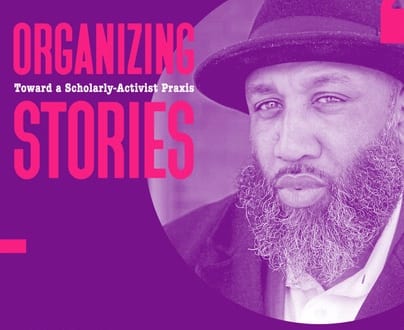By Catie Crandell, Humanities Council
Trenton activist Darren “Freedom” Green spoke to a group of faculty and students in the latest discussion in the workshop series Organizing Stories, a project founded and directed by Monica Huerta (English; American Studies) and Autumn Womack (English; African American Studies) and supported by the Council’s Exploratory Grant in the Humanities. This talk was co-hosted by the Program in Humanistic Studies course “Arts in the Invisible City: Race, Policy Performance” taught by Vance Smith (English) and Nathan Davis (Lewis Center for the Arts).
Green, whose work creates a “link between thinking and writing and action” according to Smith, spoke to his mission of “returning the humanity to the people living in Trenton.” His phrasing, he explained, is inspired by James Baldwin’s statement to people of color: “Please try to remember that what they believe, as well as what they do and cause you to endure does not testify to your inferiority but to their inhumanity.”
At the foundation of Green’s activist philosophy is a commitment to enabling young people to get involved in making change. “They are dreamers and amazing young people who have visions, goals, and objectives,” he explains, which means that, rather than leading them, “really, actually we have to be doing a lot of listening.” Green teaches 7th and 8th graders and speaks at all middle school graduations in Trenton, and works to introduce his students to writers they can relate to. Baldwin is a central figure who gives students a critical literary role model and a touchstone for their experiences. Green also gives his students a foundation in civics and financial literacy in order to equip them with the tools they need to change their communities and succeed.
While educating students is central to Green’s project, he also sees work with parents and grandparents as essential to making change, connecting generations, and continuing legacies. To this end, Green has developed a “parent university” that teaches parents about their rights, civil opportunities and responsibilities. Green challenges young parents to take an active role in shaping their own lives and asks them “Is this the life you dreamed for yourself?” Green also sees elders as “walking bookshelves of the community” with stories and lessons to offer, but unless they are given the opportunity to connect to other generations their expertise and experience remain untapped. Empowering individuals and connecting these three key generations, Green has put Trenton’s future into the hands of its community members.
Green avows that there are spiritual, mental, and emotional components to connecting with people, and his goal as mayoral candidate for Trenton has been to “move the souls of every person living in this city.” Ultimately, his goal is to “move [Trenton] from being trifling to triumphant.”
Organizing Stories receives additional support from the Dean of the Faculty, the University Center for Human Values, the Department of African American Studies, and the Princeton African Humanities Colloquium. The series investigates the long histories of anti-racist activism racial justice organizing, and coalition-building as they relate to questions of narrative, storytelling, and humanistic study more broadly.
The next workshops are led by artist and performer Ni’ja Wilson on April 8 and photographer and filmmaker Indrani Pal-Chaudhuri on April 22.
















